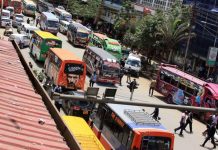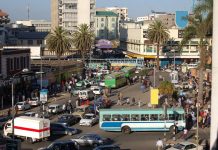A thriving motorbike transport industry in Kenya has lifted economies of various rural and urban centers, with the machines imported mainly from China changing the fortunes of many.
Across rural Kenya, economies of most of the regions now revolve around the motorbikes.
It is a similar case in many urban areas where motorbikes have helped boost 24-hour economy and ease transportation of goods and people.
Nahashon Kiarie is a motorbike taxi operator in Kitengela, a fast-growing suburb on the south of Nairobi.
His day starts at 5 am, where he picks two commuters from their homes and ferries them to the main bus terminus for them to board a vehicle to Nairobi city center.
By the time he returns home for breakfast at about 8am, he would have ferried at least five more customers.
“I earn my living from my motorbike. This is where I get money for my rent, food, clothing and all my other needs,” said Kiarie on Thursday.
Kiarie earns up to 1,500 shillings (15 U.S. dollars) in a good day, money that he spreads on all his expenses.
“Every day I must buy food, which means I create a job for the vegetable seller and the shopkeeper and all this is because of the motorbike,” he said, noting he bought his Haojin machine at 750 dollars.
The high number of motorbike operators in the suburb, just as in many others, has brought fortunes to landlords.
The property owners are building single-roomed houses mainly made of iron sheets which they rent out to the tens of motorbike taxi operators at 20 dollars per month.
“There is good business in the motorbike riders. I had eighth-acre piece of land which was idle for years because I did not have money to build concrete houses. But I have now built 20 one-roomed iron sheet houses and they are all occupied by motorbike taxi riders,” said Bernard Mureithi, a landlord in Kitengela.
In rural areas, that the Chinese-made machines have transformed lives is evident. Most young people who ordinarily would have been idle and be lured to crime are now engaged in the motorbike transport industry.
Juma Otiato, a resident of Budalangi in Busia western Kenya, struggled to eke a living for years until he was employed as a motorbike taxi rider three years ago, earning 3 dollars a day.
His hard work and dedication saw him buy a second-hand motorbike two months ago making him his own boss. “As long as you have a motorbike, you cannot lack food and other needs,” he said.
The rise in the number of motorbikes which go for between 700 dollars and 1,000 dollars has created opportunities for spare parts sellers and repairers of the machines, with the shops dotting most rural trading centers.
Motorbikes remain the most bought motor vehicles in the east African nation, with new registrations standing at over 200,000 annually, according to the Kenya National Bureau of Statistics.
Chinese motorcycles account for over 50 percent of Kenya’s motorbike market, with the
machines injecting million dollars daily into the economy, according to Kenya Boda Boda Association.
The association notes its members drive huge fuel sales, each spending up to 5 dollars on fuel daily.
Ernest Manuyo, a business lecturer at Pioneer Institute acknowledged that motorbikes have created new economic statuses for regions and individuals.
“If you think from the point of view that most of the riders would have been idle then you appreciate how the machines are contributing to the economy,” he said.
There are close to a million motorbike taxis in Kenya, with each earning an average of 5 dollars a day. “That means up 5 million dollars is circulated into the economy a day. This is significant,” he said.








![Top 20 Used Cars to Avoid Buying in Kenya – [PHOTOS]](../../../blog/wp-content/uploads/2013/11/top-used-unreliable-cars-to-avoid2-80x60.jpg)

![Top 20 Used Cars to Avoid Buying in Kenya – [PHOTOS]](../../../blog/wp-content/uploads/2013/11/top-used-unreliable-cars-to-avoid2-100x70.jpg)





